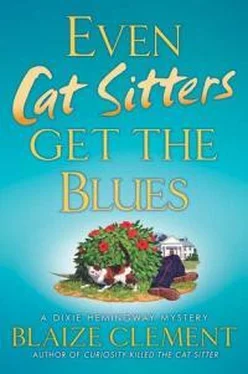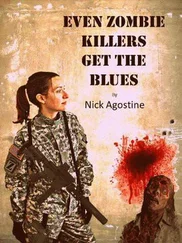My grandmother never took to Bobby the way the rest of us did, and when he grew to be about four feet long, she banished him from the house. He lived the rest of his life in the trees, just coming down to nibble on the hibiscus and eat fruits and vegetables we left out for him. Except for a time when he sacrificed his tail to some unknown predator, his life was peaceful. His tail grew back darker and shorter than the original, but he seemed quite happy. He lived over ten years and died during an unexpected freeze that wiped out Florida’s citrus crop. When he died, our grandfather wept. Neither Michael nor I had ever seen our grandfather shed a tear before, and his grief over an iguana’s death had been as sobering as losing Bobby.
In the carport, a couple of great blue herons were sitting on the hood of my Bronco, where they’d taken shelter from the rain. Down on the shore, black gulls were putting on an aerialist show a few feet above the waves, while a few snowy egrets ignored them and made fresh tracks in the sand as they gathered up sand crabs washed in by the rain. I shooed the herons away and pulled the Bronco out of the carport onto the drive that winds to Midnight Pass Road. I told myself I wasn’t going to think about the dead guard again, but I knew I was lying.
For the next hour, I concentrated on feeding and grooming the two cats on my schedule. I played chase-the-peacock-feather with each of them, and I cleaned their litter boxes. Before I left them, I turned on their TV sets—the wild-life channel, but with the sound muted—and made sure they had plenty of fresh water. They both gave me a couple of tail swishes to let me know they approved of my performance and then pretended to ignore me when I left. I love that about cats. They may be secretly gloating that they’ve made a human wait on them like they’re royalty, but they never lose their cool and actually show what they’re feeling. I wish I were more like a cat.
When I finished grooming the second cat, I checked the iguana’s address again and headed north, looking for the number. For private houses, street numbers are rare along that stretch of Midnight Pass Road. The general attitude is that nobody has any business going to a person’s house if they don’t already know where they live anyway, so why post street numbers just for the curious?
When I drove past the mansion with the dead guard in the guardhouse, I allowed my head to turn and look down the drive. Two ambulances, three green-and-white sheriff’s cars, and a Medical Examiner’s van were parked along the edge of the drive. At least I could stop worrying that the murdered guard was still alone in there.
A block or so later, I saw a street number and realized I’d passed the iguana’s house. I pulled into a condo parking lot and doubled back, driving slowly while I tried to find another house number. At the driveway to the guardhouse, the Bronco sort of turned itself in, and I sat staring at the crime scene cars while a horrible realization trickled into my brain.
My new iguana client lived in the house where the guard had been shot in the head.
THREE
I parked behind the sheriff’s vehicles and crawled out of the Bronco like a possum slinking out of a tree. The last thing I wanted was to explain to the crime-scene people why I was there.
Sergeant Woodrow Owens saw me first. A pained expression crossed his face, and he put his hand over his eyes for a moment like he hoped I was an apparition that would go away. Sergeant Owens is a tall, loose-jointed, sad-eyed African American who, if he were a dog, would be a basset hound. He was my commanding officer when I was a deputy. When Todd and Christy were killed and everybody else expected me to get my act together and come back to work, it was Sergeant Owens who finally had the grit to tell me the honest truth—I was way too fucked up to carry a gun for the county. I’ve always respected him for coming right out and saying it and not pussyfooting around. There’s something reassuring about having your own emotional instability recognized and authenticated. Once that’s done, you can get on with the business of getting through life without the added stress of trying to fake normal.
He said, “Dixie, I’m almost afraid to ask why you’re here.”
I said, “I have a pet client in this house.”
“You know Kurtz?”
“Who?”
“Ken Kurtz, the man who lives here.”
So that was his name. Not Curtis, like I’d written when we talked.
“Never met him, but he called last night and asked me to come today and feed his iguana.”
I glanced at the yellow crime-scene tape around the guardhouse and tried to look innocent. “What’s going on?”
“Somebody shot the guard.”
“Anybody else hurt?”
“Just the guard.”
Well, that was a relief.
Sergeant Owens said, “When Kurtz called you, did he say where he was?”
“New York. He said he’d be home today.”
“You get a number?”
I felt myself redden. Heck, I hadn’t even got the man’s name right.
“He hung up before I could, and the ID thing said NUMBER UNAVAILABLE.”
“Okay, come with me.”
He went loping off down the driveway toward the areca palm hedge so fast I had to trot to keep up with him. Beyond the hedge, the driveway curved and widened to a four-car garage. At first I thought the garage formed one wing of an L-shaped single-story house, but then I realized the house was built around a courtyard with a tall oak tree in its center. Sergeant Owens made a sharp right angle and walked down a long paved path between the privacy hedge and the side wall of the garage. We passed an expanse of clear glass and stopped at double doors painted glossy lipstick red. I had seen so much Christmas stuff that morning that I caught myself thinking a tasteful pinecone wreath would have looked good on the red door, but it was bare.
Looking over his shoulder to make sure I was still with him, Sergeant Owens jabbed one bony finger at the bell, and then we both took a step back and gawked through the glass like people in a department store staring at whatever dumb show is being flashed across a row of TV screens. The living room was decorated in low-slung,honey-hued , leather-steel-and-polished-stone furnishings like you see in Architectural Digest, the sort of room that makes me want to run amok flinging cat hair and peanut shells.
The back wall was dominated by a fireplace big enough to roast an ox, with a wide hearth and a bunch of brass and black iron tools for poking and shoveling fire stuff. Good-sized flames were leaping in the thing right now, which was downright bizarre. I mean, the weather was chilly but not that chilly. Even having a fireplace that size was an anomaly on Siesta Key, since we have maybe two weeks a year when a fireplace is inviting. The rest of the time it makes you feel sweaty just to look at one. People on the key who can’t resist the nostalgic feel of a fireplace keep them small and unobtrusive, little hollows where they can grow bromeliads or ferns, but this baby was meant for serious roaring fires.
A woman came streaking past the fireplace toward the front door, and Sergeant Owens and I got our faces into neutral expressions.
The woman who opened the door took the term “drop-dead gorgeous” to a whole new level. She was the kind of woman who makes me remember that my split ends need trimming, my eyebrows need shaping, I need a manicure, and a facial wouldn’t hurt. Not that she looked like she tried to be gorgeous, it was just how she was. Pale-gold Eurasian skin, almond-shaped topaz eyes, masses of long red curls carelessly caught up at the top of her head to cascade around a graceful neck. Sweeping eyelashes a foot long. Naturally rosy full lips, with a tiny dark beauty mark beside them, as if the angel who’d made her had been so carried away by the perfection he’d created that he’d taken a little brush and added a coded signature. Her hands were in thin latex gloves like surgeons use, and instead of a Miss America sash draped shoulder to hip she wore wrinkled blue-green surgical scrubs and white running shoes.
Читать дальше












